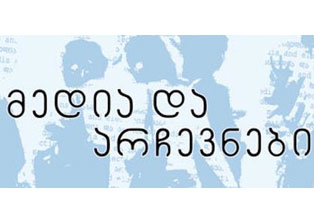Nino Gvaridzishvili, Kakheti
Group of media-monitors think both pre-election environment and style of media activities during Presidential Elections were radically different from the last year situation. They said the pre-election media-coverage was conducted in relatively calm and balanced environment.
Four nongovernmental organizations –Fair Elections (ISFED), CRRC, Internews and Civil Development Institute – presented the results of the media-monitoring. The projects were implemented with financial support of the EU and UNDP.
They monitored TV, printed, radio and online media sources. The monitoring includes both quantitative and qualitative components.
CRRC observed talk-shows and main newscasts of the TV-Companies: “It is nice that in comparison with the previous elections, polarization and negative tone of coverage was less observed this year; however lack of analytic packages, poor information with no sources still remain main problems,” said Keti Chubinishvili of the CRRC and added that it is noteworthy that media outlets did not actively cover the election programs of the presidential candidates. Internews monitored newscasts of radio stations. The survey showed that in the pre-election period anchors were not critical and problem of misbalance was particularly urgent in regional Radio Stations. Radio Old Town reported about the activities of only Giorgi Margvelashvili; approaching elections were not highlighted in newscasts of the Radio Adjara at all. “First Radio” released diverse information though in a low quality,” noted Internews’ representative. A journalist of the First Radio, who attended the presentation, protested the evaluation. She did not agree with the authors of the survey and said the monitoring was not properly carried out and the conclusions were superficial.
Giorgi Jologua of the Civil Development Institute, who monitored online media, agreed with his colleagues and said that election media coverage was improved though he underlined articles and news of the online media-portals Droni.ge and For.ge, which reflected personal attitudes to the issue. “For.ge permanently interviews several experts and all their evaluations end with the criticism of the President and UNM,” Jologua said and added that Netgazeti.ge covered the pre-election period most professionally, which reported about every presidential candidate impartially and in balanced manner.
ISFED monitored printed media and concluded that newspapers Asaval-Dasavali and Alia were most problematic. “The monitoring showed that ethic norms were breached in these newspapers that is one of the most problematic issues. They often disseminate unverified information and create caricatures,” Nana Tabatadze of the ISFED said.
The monitoring covered period from October 16 to October 26 but as the project participants said at the presentation, their findings from the Election Day and post-election period will be presented in December, 2013.
News
December 13, 2023
Ethnic minorities outside the peace dialogue
November 6, 2023
‘Peace’ agenda of political parties
Popular
Articles
February 13, 2024




